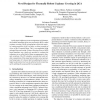Free Online Productivity Tools
i2Speak
i2Symbol
i2OCR
iTex2Img
iWeb2Print
iWeb2Shot
i2Type
iPdf2Split
iPdf2Merge
i2Bopomofo
i2Arabic
i2Style
i2Image
i2PDF
iLatex2Rtf
Sci2ools
124
click to vote
DATE
2006
IEEE
2006
IEEE
Novel designs for thermally robust coplanar crossing in QCA
In this paper, different circuit arrangements of Quantumdot Cellular Automata (QCA) are proposed for the so-called coplanar crossing. These arrangements exploit the majority voting properties of QCA to allow a robust crossing of wires on the Cartesian plane. This is accomplished using enlarged lines and voting. Using a Bayesian Network (BN) based simulator, new results are provided to evaluate the robustness to so-called kink of these arrangements to thermal variations. The BN simulator provides fast and reliable computation of the signal polarization versus normalized temperature. It is shown that by modifying the layout, a higher polarization level can be achieved in the routed signal by utilizing the proposed QCA arrangements.
| Added | 10 Jun 2010 |
| Updated | 10 Jun 2010 |
| Type | Conference |
| Year | 2006 |
| Where | DATE |
| Authors | Sanjukta Bhanja, Marco Ottavi, Fabrizio Lombardi, Salvatore Pontarelli |
Comments (0)

